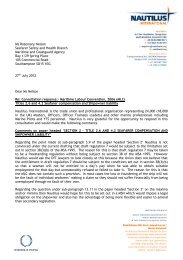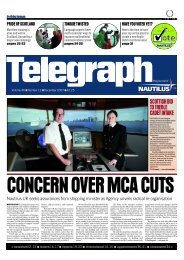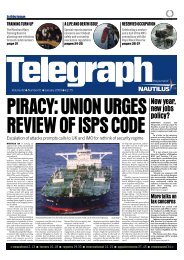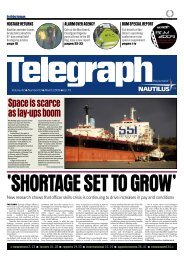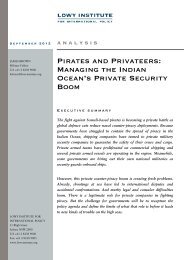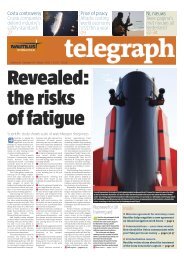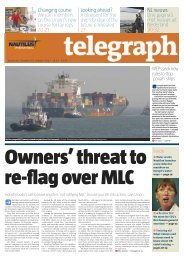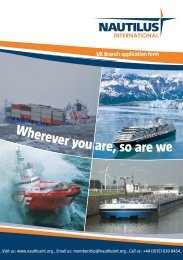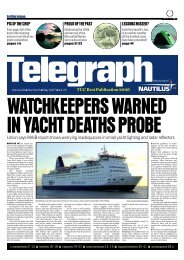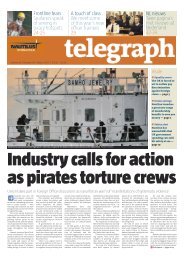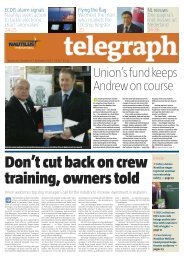NAUTILUS P01 OCTOBER 2010.qxd - Nautilus International
NAUTILUS P01 OCTOBER 2010.qxd - Nautilus International
NAUTILUS P01 OCTOBER 2010.qxd - Nautilus International
Create successful ePaper yourself
Turn your PDF publications into a flip-book with our unique Google optimized e-Paper software.
October 2010 | nautilusint.org | telegraph | 11<br />
NEWS<br />
TUC backs asbestos call<br />
Seafarers face increased risks of exposure to deadly material despite rules<br />
intended to outlaw its use onboard ships, Council member tells Congress<br />
P<strong>Nautilus</strong> <strong>International</strong><br />
has secured the unanimous<br />
support of the<br />
TUC Congress for its campaign to<br />
secure tougher controls against<br />
the threats posed by asbestos on<br />
ships.<br />
Delegates at the TUC’s annual<br />
conference in Manchester voted<br />
in support of a <strong>Nautilus</strong> motion<br />
expressing concern at the continued<br />
presence of asbestos on<br />
ships — despite international<br />
rules, introduced in 2002, that<br />
sought to prevent its use.<br />
Council member Captain<br />
Stephen Gudgeon — a serving<br />
shipmaster — moved the motion<br />
and told the meeting of evidence<br />
showing that the regulations are<br />
being broken with impunity.<br />
<strong>Nautilus</strong> had been horrified to<br />
find the deadly material in more<br />
than 3,500 parts onboard a newlybuilt<br />
ship last year, he said, and<br />
one classification society recently<br />
revealed that asbestos had been<br />
detected on 95% of ships checked<br />
in the last four years.<br />
‘The problem even affects<br />
ships that have been certified<br />
as asbestos-free — sometimes<br />
because they have been built with<br />
the material present in components,<br />
and sometimes because<br />
the substance has been introduced<br />
through spare parts,’ Capt<br />
Gudgeon warned.<br />
‘Shipping is the most <strong>International</strong><br />
of all industries, and our<br />
worry is that asbestos is still being<br />
commonly used in more than<br />
100 countries around the world,’<br />
he said.<br />
‘More and more ships are<br />
being built in new shipbuilding<br />
nations where asbestos use is<br />
taken for granted, and we have<br />
been told of ships being contaminated<br />
after asbestos fire blankets<br />
were used during welding work in<br />
foreign ports.’<br />
Capt Gudgeon said seafarers<br />
face higher risks than workers<br />
ashore because ships serve as<br />
their homes as well as workplaces<br />
for long periods and they do not<br />
have rapid access to specialist<br />
advice and support if asbestos is<br />
discovered. They also face a very<br />
real risk of exposure to asbestos<br />
during repair or maintenance<br />
work and big efforts need to be<br />
made to raise awareness among<br />
crews, shipowners and regulatory<br />
authorities.<br />
Shipboard asbestos also poses<br />
a risk to demolition workers, Capt<br />
Gudgeon pointed out, and they<br />
often work in developing nations<br />
with little protective equipment<br />
and poor safety standards.<br />
He told how the Australian<br />
government has recently taken a<br />
stand against non-compliance by<br />
refusing entry to vessels containing<br />
asbestos — and said other<br />
governments should be encouraged<br />
to do the same.<br />
‘For shipping, sadly, asbestos<br />
is not a thing of the past — it<br />
remains a problem of the present<br />
and of the future. In 2010, the<br />
maritime industry is still, on a<br />
daily basis, responsible for exposing<br />
its workers to asbestos and<br />
thus creating victims for decades<br />
ahead,’ he added.<br />
‘It’s just not good enough, and<br />
we need your support to ensure<br />
that our members — and seafarers<br />
worldwide — are properly protected<br />
and do not continue to<br />
inherit the deadly legacy of this<br />
material.’<br />
Supporting the motion, Barrie<br />
Worth of the Prospect union said<br />
it was appalling that seafarers<br />
were being threatened by<br />
asbestos 25 years after the government<br />
banned the use of blue<br />
and brown asbestos. ‘We share<br />
<strong>Nautilus</strong>’s alarm at the continued<br />
use of asbestos on ships and the<br />
apparent criminal activity that<br />
enables ships to be certified<br />
asbestos-free when they clearly<br />
are not,’ he added.<br />
Capt Stephen Gudgeon<br />
speaks on asbestos<br />
Picture: Andrew Wiard<br />
<strong>Nautilus</strong> warns of threats to RFA’s status<br />
AHands off the Royal Fleet<br />
Auxiliary! That was the<br />
message to the government<br />
as delegates to the TUC conference<br />
unanimously backed a <strong>Nautilus</strong><br />
motion opposing any moves to<br />
downsize or commercialise the vital<br />
work carried out by the service.<br />
Moving the motion, RFA officer<br />
Martin Troman — pictured right —<br />
explained how the RFA has, for more<br />
than a century, provided essential<br />
strategic seaborne support for the<br />
armed forces.<br />
‘With more than 750 officers and<br />
1,450 ratings on its books, the RFA is<br />
now the biggest single employer of<br />
British merchant seafarers and — as<br />
a result of the long-term decline of<br />
the Merchant Navy — has become<br />
increasingly important in providing a<br />
pool of skilled and experienced UK<br />
seafarers and a fleet of ships that<br />
can be relied upon at a time of<br />
national crisis,’ he added.<br />
Mr Troman said the RFA could<br />
demonstrate a remarkable record of<br />
success in war and peace. ‘From<br />
providing support to military<br />
campaigns such as the Falklands and<br />
the Gulf Wars and supporting the UN<br />
in Bosnia, to proving humanitarian<br />
relief in Iraq, Haiti and Mozambique,<br />
protecting ships from piracy off<br />
Somalia, and helping to combat<br />
drug smuggling in the Caribbean,<br />
the RFA delivers time and time<br />
again.’<br />
But despite this, Mr Troman said<br />
the RFA is repeatedly coming under<br />
pressure — both from commercial<br />
companies hoping that parts of its<br />
work will be privatised and from<br />
Treasury cost-cutting. Concerns had<br />
been heightened by another ‘value<br />
for money’ review and by reports of<br />
Martin Troman moving the RFA<br />
motion Picture: Andrew Wiard<br />
what the government is considering<br />
as part of its strategic defence<br />
review.<br />
‘There are good grounds for<br />
fearing that ministers will be lured<br />
by the siren calls of short-term<br />
savings from commercialising some<br />
cherry-picked parts of our services,’<br />
he added, ‘and we’re also seriously<br />
concerned about the desperate<br />
delay in building new ships to<br />
replace single-hull tankers that,<br />
under international maritime<br />
pollution regulations, really<br />
shouldn’t be at sea any more.’<br />
Mr Troman said the UK’s<br />
economic and strategic wellbeing is<br />
as reliant upon the sea as it ever<br />
was, and he urged the conference to<br />
support <strong>Nautilus</strong> in seeking to<br />
ensure the RFA can continue to play<br />
a pivotal part in protecting maritime<br />
trade.<br />
‘I have completed over 40 years’<br />
service in the RFA, so it is not my<br />
future that I am speaking for,’ he<br />
added. ‘My concerns are for future<br />
generations to be given a similar<br />
opportunity of a long and fulfilling<br />
career at sea, for the future of the UK<br />
shipping industry as a whole, for the<br />
future strategic well-being of our<br />
island nation and for the long-term<br />
role of the RFA in helping to achieve<br />
all these aims.’<br />
RMT delegate Mark Carden said<br />
RFA seafarers had consistently<br />
displayed professionalism,<br />
dedication and bravery, and it was<br />
important that the unique and<br />
specialist role of the service is<br />
safeguarded. Privatisation of the RFA<br />
would devastate employment of<br />
British seafarers and undermine the<br />
government’s maritime policies.<br />
Alan Dennis, of the PCS union,<br />
praised the ‘fantastic work’<br />
undertaken by the RFA and said it<br />
was a disgrace that its seafarers<br />
were being treated so badly after all<br />
their hard work and sacrifice.<br />
He said it was appalling that the<br />
RFA is exposed to ‘a constant<br />
onslaught’ of reviews, often by very<br />
highly paid consultants, and warned<br />
that the strategic defence review<br />
was nothing more than a ‘job cuts<br />
and asset sales exercise’.<br />
<br />
<br />
We've more experience in the field of distance<br />
learning than any other maritime sector provider.<br />
Working with education and training providers to<br />
deliver seafarer-focused opportunities for qualityassured<br />
personal and professional development.<br />
Supporting seafarers is our strength<br />
Find out more at: marine-society.org<br />
202 Lambeth Road<br />
London SE1 7JW<br />
Telephone 020 7654 7050<br />
Email ms@ms-sc.org<br />
A charity registered in England and Wales<br />
313013 and in Scotland SC037808




